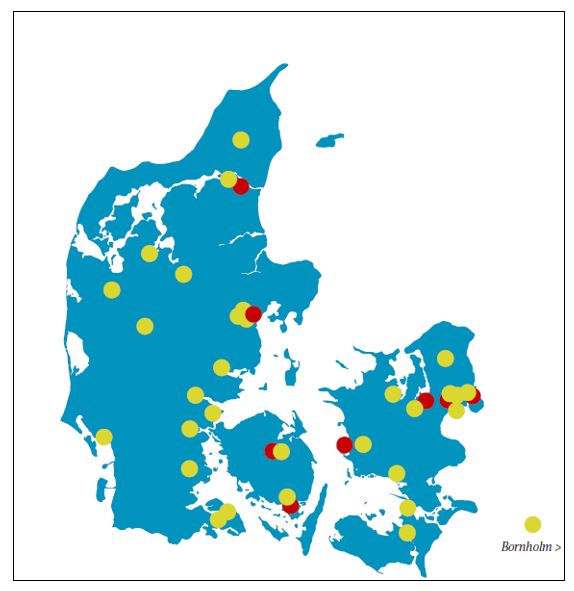The European Federation of Neurological Associations (EFNA) has launched a new Member of the European Parliament [MEP] Interest Group on Brain, Mind and Pain.
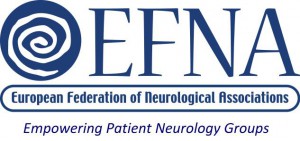 EFNA is the umbrella organisation for more than 20 pan-European disease-specific neurology patient organisations. It will work with Pain Alliance Europe to push neurological and chronic pain conditions higher up the European agenda.
EFNA is the umbrella organisation for more than 20 pan-European disease-specific neurology patient organisations. It will work with Pain Alliance Europe to push neurological and chronic pain conditions higher up the European agenda.
Across Europe, 1 in 3 Europeans are affected by a brain disorder and 1 in 5 by chronic pain. However, two thirds of people with brain disorders receive no treatment and 40% of people with chronic pain report that it is not adequately controlled.
 EFNA President Audrey Craven says: “The aim is to encourage research into and access to innovative treatments, promote prevention and self-management approaches, decrease stigma and work together to improve quality of life for people living with these disabling conditions.”
EFNA President Audrey Craven says: “The aim is to encourage research into and access to innovative treatments, promote prevention and self-management approaches, decrease stigma and work together to improve quality of life for people living with these disabling conditions.”
The new group will be co-chaired by MEPs Marian Harkin, Jeroen Lenaers and Daciana Sârbu, with more than 40 additional MEPs and the European Health Commissioner already signing a Register of Supporters.
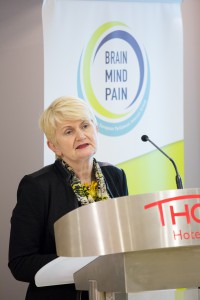 Addressing the meeting, MEP Marian Harkin outlined that the annual cost of brain disorders in Europe is € 800 billion – this is 6% of GDP. The cost of chronic pain could add a further 3% of GDP. However, she highlighted that public awareness, research and funding for these disease areas is not equivalent to the burden and impact. In fact, public research funding for brain disorders equated to only 0.2% of the cost, with the industry investing just a further 0.8%. Something must be done now, she said, before this problem becomes too difficult to handle – including putting these issues onto the political agenda at an EU and Member State level.
Addressing the meeting, MEP Marian Harkin outlined that the annual cost of brain disorders in Europe is € 800 billion – this is 6% of GDP. The cost of chronic pain could add a further 3% of GDP. However, she highlighted that public awareness, research and funding for these disease areas is not equivalent to the burden and impact. In fact, public research funding for brain disorders equated to only 0.2% of the cost, with the industry investing just a further 0.8%. Something must be done now, she said, before this problem becomes too difficult to handle – including putting these issues onto the political agenda at an EU and Member State level.
The next speaker was MEP Daciana Sarbu who said: “I am especially convinced of the need for preventive measures and information campaigns for the general public. Some of these disorders can be prevented with the right lifestyle choices. Prevention is an important part of health care policy, along with research, access to treatments and patient involvement. I believe that health care policies which give due consideration to prevention are the most effective for patients, and the most cost-effective for national healthcare systems,” she said.
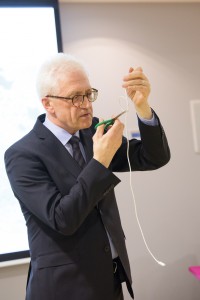 Also, prevention was one of the key focusses of the next presenation from Prof Wolfgang Oertel of the European Academy of Neurology who said that with sufficient committment – including adequate funding – many neurological disorders, for example Parkinson’s Disease, could be pre-empted and treated. He also called on the European Institutions to:
Also, prevention was one of the key focusses of the next presenation from Prof Wolfgang Oertel of the European Academy of Neurology who said that with sufficient committment – including adequate funding – many neurological disorders, for example Parkinson’s Disease, could be pre-empted and treated. He also called on the European Institutions to:
- Undertake a benchmarking exercise to assess current neurological infrastructure in Europe
- Develop a plan to implement acceptable standards of neurological services and care
- Routinely compare new and existing healthcare structures, diagnostic tests as well as treatments before roling them out across Europe
- Find ways to attract and retain the best young European clinicians and scientists for brain research and brain health.
Ms Craven said that the Interest Group was to be a ‘working group not a talking shop’ and that each subsequent meeting would have a specific topic which would end with concrete conclusions/recommendations and measurable outcomes. She then launched the Book of Evidence which outlines why neurological and chronic pain disorders should be a political priority – with exemplars and case-studies of replicable good practice. This can be accessed at www.brainmindpain.eu
This document was endorsed by the Health Commissioner Andriukatis who said he welcomed the intention of the Interest Group to focus on supporting concrete action: “Today’s presentation of the Book of Evidence is an important step to map priorities for action and to launch a call for action. This is indeed what Europe is about: Identifying what works in one part of the EU, sharing knowledge, encouraging and supporting evidence-based policies.”
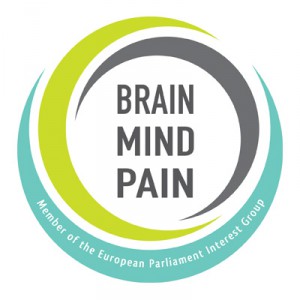 MEP Sarbu will host the next Interest Group meeting on June 24th 2015. This will focus on Health Prevention and Promotion and will explore raising awareness of common risk factors (e.g. obesity, poor nutrition, smoking, sedentary lifestyles, etc.), outlining what can be done at an EU-level and strategies for rolling out awareness campaigns on this topic in the EU Member States. The Commissioner has been invited to give the keynote address. This meeting will take a roundtable format with limited places available. So if you are interested in participating and contributing to the discussion please email: euaffairs@efna.net with your name, organisation and a few sentences outlining your interest in the topic.
MEP Sarbu will host the next Interest Group meeting on June 24th 2015. This will focus on Health Prevention and Promotion and will explore raising awareness of common risk factors (e.g. obesity, poor nutrition, smoking, sedentary lifestyles, etc.), outlining what can be done at an EU-level and strategies for rolling out awareness campaigns on this topic in the EU Member States. The Commissioner has been invited to give the keynote address. This meeting will take a roundtable format with limited places available. So if you are interested in participating and contributing to the discussion please email: euaffairs@efna.net with your name, organisation and a few sentences outlining your interest in the topic.
Two video clips are also available on Youtube. Here is the short interview with Prof Oertel.




